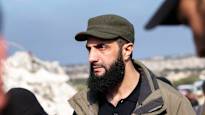When the leader of the Syrian rebels Ahmed al-Sharaa arrived victorious in Damascus, he knelt down and delivered a sermon in the Umayyad Mosque to a cheering crowd.
According to the researcher, this reflects al-Sharaa’s personality.
– The fact that he was there to lead the prayer was symbolically very significant, says the doctoral researcher Tiina Hyuppa from the University of Helsinki.
According to the hype, al-Sharaa thus emphasized his leadership.
– He also likes to be in the limelight and get attention and knows how to take it.
According to Hyypä, Syria’s new leader is a skilled opportunist and pragmatic actor who appears to his own audience in one way and to Western countries in another.
– He can be interviewed by foreign media in a suit and tie, while for his own supporters he appears in green army clothes, says Hyyppä.
Al-Sharaa is also known by his fighting name Abu Muhammad al-Julani.
HTS still classified as a terrorist organization
The jihadist group Hayat Tahrir al-Sham, or HTS, led by Al-Shara has a radical Islamist background. However, it differs from al-Qaeda and ISIS in that its jihadist goals do not extend beyond Syria. The EU and the United States still classify the organization as a terrorist organization.
In recent years, Al-Sharaa has tried to portray himself as a moderate leader, although many doubt the sincerity of his words.
– They have taken a strategic line and want to communicate that they are tolerant and pluralistic, Hyyppä states.
Already three years ago in his first interview to a US reporter al-Sharaa insisted that his group posed no threat to the West.
Radicalization in Iraq
Al-Sharaa’s path to becoming a jihadist leader began in Iraq, where he went to fight the US against the troops in 2003. Al-Sharaa ended up in the US prison camp at Camp Bucca, where he met and networked with members of the current terrorist organization ISIS.
– While in the prison camp, he received radical ideological influences, says Hyyppä.
The now 42-year-old al-Sharaa was born in 1982 in Syria to a middle-class family that had been forced to leave their home in the Israeli-occupied Golan Heights. It also gives rise to his fighting name al-Julani, which means Golan in Arabic. He also used this as his nickname until the revolution.
– He started using his real name only after the revolution, possibly again to show that he had changed, says Hyyppä.
al-Sharaa returned to Syria at the beginning of 2012, when the country was in a civil war. He was founding the jihadist organization Jabhat al-Nusra, which fought against Bashar al-Assad’s regime. Al-Sharaa severed its connection with ISIS and later in 2016 with al-Qaeda. In 2016, the organization changed its name to Hayat Tahrir al-Sham.
For 12 years, Al-Sharaa has managed to keep itself as a leader. The fact that he has been able to keep himself alive also raises questions for the researcher, Hyyppä states.
– There has been speculation as to why the United States has allowed him to live. The United States has carried out several attacks in the Idlib region, in which ISIS and al-Qaeda leaders have been killed, says Hyyppä.
– I wouldn’t be surprised if he managed to make some kind of agreements with the United States.
The United States and the EU consider al-Sharaa a terrorist. The United States has still promised a reward of 10 million dollars, or 9.5 million euros, for him.
Mandatory scarf unlikely
Although al-Sharaa’s HTS organization is a jihadist organization, according to Hyypä, it is not an actor like the extremist organization ISIS.
– If al-Sharaa were to take a very radical line now, it would contradict the image of the leader he has created, says Hyyppä.
Hyypä does not think that the situation in Syria should be equated with the development of Afghanistan under the Taliban, because it is a different society in many ways. There are many different religious minorities and liberals in Syria.
– I don’t think that HTS would be able to impose, for example, a headscarf requirement, because people’s dissatisfaction would be too great, Hyyppä says.
In recent days, al-Sharaa has assured that efforts are being made to protect Syria’s ethnic and religious minorities.
– But it remains to be seen how well these promises are kept, says Hyyppä.
